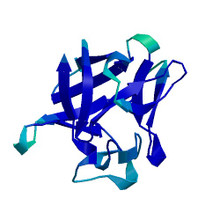 Loading... Please wait...
Loading... Please wait...Categories
bFGF, human
(Recombinant Human Fibroblast Growth Factor 2; Fibroblast Growth Factor-basic; bFGF; FGF-2; basic FGF)
Purity: >96% by SDS-PAGE and HPLC analyses
Source: Escherichia coli
FGF2 (bFGF or FGF basic) is a single-chain polypeptide growth factor is an essential for the growth of many stem and progenitor cells.
FGF2 shares a 55% amino acid residue identity with FGF1 and interacts with heparin sulfate with nanomolar affinity. It is a potent inducer of DNA synthesis in a variety of cell types. FGF2 activates mesenchymal splice variants of FGF receptors (c splice variants) and also activates FGF Receptor 1b, but has little activity against FGFR2b or FGFR3b. It is most closely associated with FGF1 (aFGF).
FGF2 is a member of the Fibroblast Growth Factor family of proteins.
rHuFGF 2 General Information Amino Acid Sequence (147aa):
MPALPEDGGS GAFPPGHFKD PKRLYCKNGG FFLRIHPDGR VDGVREKSDP HIKLQLQAEE RGVVSIKGVC ANRYLAMKED GRLLASKCVT DECFFFERLE SNNYNTYRSR KYTSWYVALK RTGQYKLGSK TGPGQKAILF LPMSAKS
Reconstitution:
The sample should be briefly centrifuged prior to opening to bring the contents to the bottom. Reconstitute in aqueous buffer containing 0.1% BSA to a concentration of 0.1-1.0 mg/mL. Reconstituted solutions are stable for up to one week at 2-8°C. Stock solu tions should be aliquoted and stored at -80°C. Further dilutions should be made in appropriate buffered solutions containing BSA or serum, and 1 μg/ml heparin sulfate.
Storage:
The lyophilized sample is stable at 2-8°C, but should be kept desiccated at -20°C for long term storage. The reconstituted sample can be apportioned into working aliquots and store d at -80°C for maximal stability. Avoid repeated freeze/thaw cycles.
Free Shipping within the Continental USA

